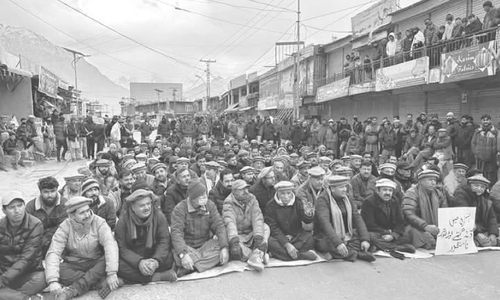PESHAWAR: An academician from Bajaur Agency on Saturday moved the Peshawar High Court challenging the judicial powers of Fata’s executive officers under the Frontier Crimes Regulation (FCR) as well as the appointment of retired bureaucrats as chairman and member of the FCR Tribunal.
Professor Anwar Shah, a teacher of mathematics in the Bajaur Degree College, filed a petition with the court seeking orders to declare illegal and unconstitutional the exercising of judicial powers by political agents, assistant political agents and commissioners under the FCR.
He prayed the court to declare that exercise of judicial powers in violation of Article 175(3) of the Constitution, which guaranteed the separation of the judiciary from the executive.
The petitioner requested the court to declare illegal and a violation of Article 175(3) of the Constitution the appointment of retired bureaucrats to the FCR Tribunal, the third and last judicial forum under the FCR.
Lawyer also seeks orders for end to appointment of retired bureaucrats to FCR Tribunal
He also sought the court’s directions for the respondents, including the federal government, to progressively separate judiciary from the executive in Fata as a constitutional requirement.
The petition filed through lawyer Farooq Afridi stated the petitioner had the power of attorney of his father, Gul Badshah, in the ‘Qazi Gul versus Gul Badshah’ case about a property dispute.
It added that the case was initiated in the court of the assistant political agent, Khar (Bajaur), and the trial court had passed an order in favour of the petitioner on Mar 6, 2008.
The petition said the respondent (Qazi Gul) had filed an appeal against the order of the APA but the appellate authority had maintained the order of the trial court on Jan 7, 2010.
It added that the said respondent had filed a revision petition against the orders of two courts below and the FCR Tribunal had had dismissed that petition on Mar 19, 2011, followed by a review petition, which was also dismissed on Apr 30, 2012.
The petition said since Apr 30, 2012, the issue had been pending in the court of APA for execution but the APA and other respondents had been using delaying tactics by creating hurdles to the smooth execution of the order.
The petitioner requested the high court to direct Bajaur’s political agent and APA to implement the Mar 6, 2008, order of the APA, which was upheld by the appellate authority as well as FCR Tribunal.
He said Article 175(3) of the Constitution emphasised the separation of the judiciary from the executive progressively within 14 years of the enforcement of the Constitution but in Fata, the judiciary hadn’t been separated from the executive even 45 years after the Constitution was put into effect.
The petitioner said the provision of Article 175(3) of the Constitution was mandatory but the respondents, including the federal government, badly failed to implement it.
He said the independence of the judiciary was the cardinal principal of the Constitution spelled out in its Article 2(A) but the respondents failed to take appropriate measures to bring the FCR provisions in conformity with the Constitution and findings already arrived at by the superior courts by separating the judiciary from the executive.
The respondents in the petition are the Federation of Pakistan through secretaries of the cabinet, parliamentary affairs, law, and States and Frontier Regions divisions, KP government through chief and home secretaries, president of Pakistan through his principal secretary, KP governor through his principal secretary, FCR Tribunal through its chairman, and others.
Published in Dawn, March 25th, 2018











































Dear visitor, the comments section is undergoing an overhaul and will return soon.